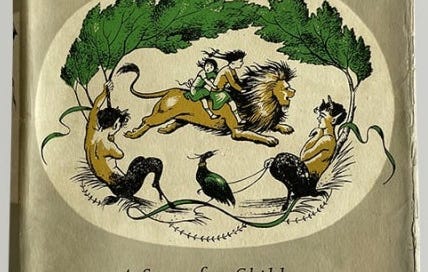3 reasons why you should read "The Chronicles of Narnia"
Here are three compelling reasons why delving into C.S. Lewis' timeless fantasy series is essential for everyone.
I’d like to present three reasons why everyone should read The Chronicles of Narnia. In short, the answer is because it is (1) For readers, (2) For writers and (3) For humans. By virtue of reading this, you already fit into two categories, unless, of course, you avert your eyes immediately, and transform into a spoon. So, sit back and prepare to be convinced.
1. For Readers
The Chronicles of Narnia is beloved by generations for its wonder, imagination, and universal appeal. From children to adults, the seven-book series has sold over 100 million copies in 47 languages, becoming a Staple of children's literature. The series has been translated into numerous languages and is almost always included in lists of best children’s books, fantasy novels, and classic literature. Any cursory search for “Best Fantasy Books of All Time” or “Top Children’s Series”, will, or at least, should point you to Lewis’ timeless tales. In that sense, all roads lead to Narnia.
The series if often widely acclaimed for its allegorical elements and Christian symbolism, which have sparked scholarly discussion, dialogue, and debate. I’ll get onto this more on point 3, however, allow me now to note the poignant pedagogical themes central to its narrative: tales of greed, the perils of temptation, the power of forgiveness, enduring hope against adversity, and the triumph of good over evil. These themes resonate deeply with our innate sense of morality and what we perceive as inherent human values.1
First edition copy of The Lion, the Witch, and the Wardrobe
2. For Writers
C. S. Lewis’ approach to writing The Chronicles of Narnia is a masterclass in world-building, allegory, and character development. The series illustrates how to capture a reader’s imagination whilst embedding complex themes into seemingly simple stories. Lewis weaves together fairytale elements, mythic structures with spiritual undertones, offering a layered narrative that rewards multiple readings.2 It is surely a must-read for anyone writing fantasy fiction. This is what Neil Gaiman said about The Voyage of the Dawn Treader:3
“I read it when I was six, and fell in love with Narnia and with the magical story and most of all with the auctorial voice. Lewis seemed to be having a wonderful time writing, confiding in and treating the readers as if they were smart friends. It was the first time I was ever aware that there was a person behind the words. It made me want to write. It made me want to do that magic trick.”
For writers aspiring to master the “magic trick” of enchantment, The Chronicles of Narnia is essential reading!
The Wardrobe from Disney/Walden Media film of The Lion, the Witch and the Wardrobe.
3. For Humans
The Chronicles of Narnia resonate deeply with the innate human longing for something greater – an ancient, inexpressible desire for a world beyond our own, a place we feel we were made for but have never fully seen. This sense of yearning wonder, Lewis believed, lies at the heart of the human experience. Whether we encounter Narnia as children or adults, it stirs within us a longing for a reality that seems out of reach yet achingly familiar. For Lewis, this longing played a pivotal role in his conversion from atheism to Christianity. According to philosopher Peter S. Williams, Lewis’s reflections on this desire laid the foundation for what would be regarded as the ‘Argument from Desire’, the idea that our deepest longings are signposts pointing toward a greater, transcendent reality.
When we approach Narnia through a Christian lens, its magic and mystery resonate deeply with that primal longing. The enchanted world is rich with Christian allegories, with Aslan, the great lion, at the very heart of the story. As a picture of Jesus, Aslan embodies themes of sacrifice, redemption, and resurrection, mirroring the essence of the Christian Gospel. Lewis believed that myths and stories, with their imaginative power, could communicate truth just as effectively as logical arguments. After his conversion, Lewis remarked that myth had become fact, embodied in the person of Christ. Through Narnia, Lewis offers us a tantalising glimpse of this reality, giving us the possibility that the story we desperately wish were true might, in fact, be the truest story of all.
Concluding remarks
Whether you’re seeking a beautiful story, an inspiration for your own writing, or a journey into the depths of human desire and spiritual truth, The Chronicles of Narnia has something to offer everyone. Lewis wanted his readers to not only escape; much like the characters who travelled to and from the Narnia, Lewis intended his readers to see the world differently upon their return.
I’m aware that the statement I’m making here carries a significant philosophical claim regarding objective morality. I’d be interested to hear any thoughts or insights you might have on this.
For those interested in the framework unifying these disparate elements, read Michael Ward’s Planet Narnia: The Seven Heavens in the Imagination of C. S. Lewis (2007).







Makes me wanna have another lockdown so i can read them all over again!
Alas, I can't read Narnia until I finish the Ransom Trilogy.